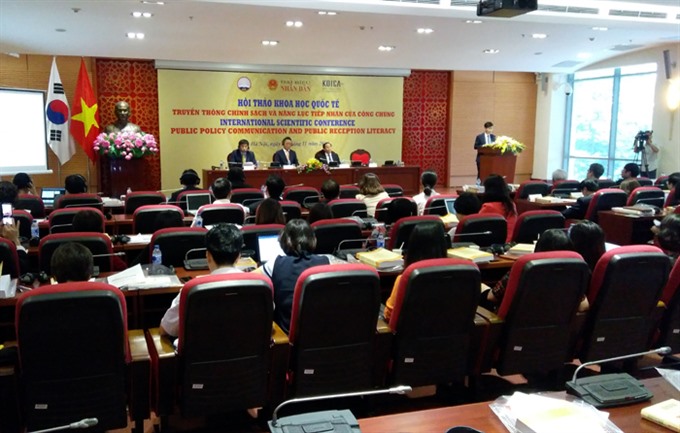 Society
Society

The public should be central in the process of policy communication to ensure the effectiveness of communication and the implementation of policies, heard an international scientific conference in Hà Nội yesterday.
 |
| The public should be central in the process of policy communication to ensure the effectiveness of communication and the implementation of policies, heard an international scientific conference in Hà Nội yesterday.— Photo dangcongsan.vn |
HÀ NỘI — The public should be central in the process of policy communication to ensure the effectiveness of communication and the implementation of policies, heard an international scientific conference in Hà Nội yesterday.
The workshop on public policy communication and public reception literacy, organised by the Academy of Journalism and Communications (AJC), the National Assembly Newspaper and the Korea International Cooperation Agency (KOICA), seeks to involve the public in policy making and implementation through effective communication.
AJC Director Trương Ngọc Nam said the public should not only be the subject of policies but also participate in policy making, give feedback on the policies and assess their impacts.
“This requires the development of new communication models and solutions such as e-Government or technology-based forms of communication to create better opportunities for the public to receive, analyse and give feedback on public policies,” he said.
Information transparency was considered a basic condition for the public to implement their “right to be informed”, he said. Only when the public got accurate and full information, could they discuss, analyse and give feedback on public policies.
Communications about National Assembly meetings, for example, helped people to easily follow policy discussions of NA deputies, he said.
Editor in Chief of the NA Newspaper Đỗ Chí Nghĩa agreed that connecting the public in policy making was an important measure to increase policy communication effectiveness and improve public policy reception, assessment and feedback.
“This also helps ensure the rights to information of the public and increase the accountability of policy making agencies,” he said.
The conference is part of a project implemented by KOICA and the AJC over the past three years on improving the implementation capacity of Government public policies.
KOICA country director Kim Jinoh said under the project, Korean experts provided training and shared experience with Vietnamese peers on public policy communication, public relations and communication strategies.
The conference allowed Vietnamese and Korean experts to seek more effective public policy communication initiatives and solutions to develop public policy communication for Việt Nam, he said.
Sharing Korea’s experience in public policy communication, professor Se-Hoon Jeong from Korea University said that apart from using traditional forms of communications such as newspapers, radios and televisions, Korea has recently made use of new media like online mobile media and social networks to inform local people of public policies.
“Using social media makes it easier and more effective to disseminate information as policymakers can send personalised messages to individuals basing on their gender, age and education level. And people also find it easier to give feedback and comments on public policies,” he said.
However, he noted that people should be cautious when accessing information online to avoid fake or inaccurate news.
Participants also pointed to the need for the press to provide accurate, short and simple information relating to public policies.
Diversifying forms of policy communications to help people in different areas in different conditions get easier access is also important, they said. — VNS




